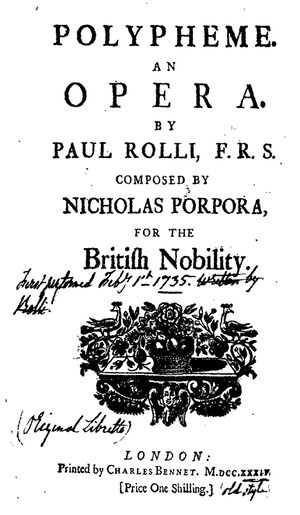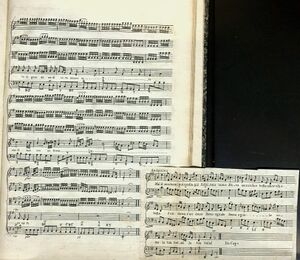Alto Giove
| Polifemo | |
|---|---|
| opera seria by Nicola Porpora | |
 English title page of the revised version of Nicola Porpora's opera Polifemo | |
| Translation | Polyphemus |
| Librettist | Paolo Rolli |
| Language | Italian |
| Based on | Metamorphoses by Ovid |
| Premiere | February 1, 1735 King's Theatre |
"Alto Giove", sung by the character Acis (Italian: Aci) in Nicola Porpora's "Polifemo", has been brought to great popularity by the motion picture Farinelli[1], where the protagonist prominently sings it. The poignant thanks to his creator for the gift of immortality that comes at the ultimate price summarized the theme of the movie perfectly and also resonated with the audiences.
"Alto Giove" is a showpiece of Porpora's artistry as much as it is of his pupil's, Farinelli. The beautiful lyrical composition shows Porpora's deep musicality – and his trust in Farinelli's ability to captivate the audience in the absence of vocal stunts.[2]
"Alto Giove" appears on the following album:
| Year | Album | Ensemble | Conductor |
|---|---|---|---|
| 2013 | Farinelli – Porpora Arias | Venice Baroque Orchestra | Andrea Marcon |
Libretto
from Polifemo
Nicolo Antonio Porpora (music), Paolo Antonio Rolli (words)
Alto Giove | |
Mighty Jove, | |
Context
The Aria opens Act III, Scene 5. The stage direction reads: "S'apre la rupe: vedesi la sorgente d'un fiume. Aci, nume del medesimo, appoggiato sull'urna e detti." ("The cliff opens: we see the source of a river. Aci, deity of the same, leaning on the urn, and the former.")[4]
Background
Translator's Commentary: It seems likely that the character Acis (Italian: Aci) does not address the same person in part A as he does in part B, for several reasons.
For one, the libretto itself suggests it; to praise to Jove's beauty seems an unlikely thing to do. Second: The libretto exists in two versions, likely mirroring two sets of performances. One does have "Alto Giove" as well as "Nell'attendere"[4], the other does not. As it seems unlikely that Porpora would cut two hit-pieces from the opera and replace "Alto Giove" with a duet, the theory that the shorter libretto is the later one is disputable.[5].
However, even the libretto where an "Alto Giove" exists does not list the B-Part. In the collection of music titled The Favourite Songs in the Opera call'd Polypheme by Sigr. Porpora printed for the devoted audience later, the B-Part seems originally to be missing; it is literally glued on.

Musically, the B-part with its triple-meter does not very fit very well with the A-part and is slightly higher in tessitura which also suggests it was added as an afterthought with the sole purpose to serve as an excuse for the da capo.
Conclusion: "Diva amorosa e bella" might be a fond address. As Acis pleads that Galatea may be restored to him (which excludes her), this leaves one other character, Nerea, who is only existent in the version of the libretto which contains "Alto Giove" – (or a different goddess altogether who might have appeared beside Jove).[4] What supports the theory of it being Nerea is that the latter appears in the preceding scene, and that, responding to Galatea's plea to Jove to restore Acis to her, she ushers in the new scene (and Acis's aria) with "T'ascoltò Giove, ed annuì co 'l ciglio." ("Jove heard you and nodded.") (FR, 2021)
Manuscripts and sheet music
- A selection of Arias from Polifemo
- Royal College of Music (Public Domain)
- Misc. Notes RCM Library item D1424/4
- OCLC 22913312
- The Favourite Songs in the Opera call'd Polypheme by Sigr. Porpora. London: John Walsh, c.1735.[2]
- Libretto at Libretti d'Opera Italiani[4]
- "Polifemo" (PDF). Libretti d'Opera Italiani. Archived from the original (PDF) on October 1, 2021. Retrieved October 1, 2021.
- Score
- Porpora, Nicola (1686-1768), Polifemo
- Title on source: Polifemo, Poesia del Sigr. Paolo Rolli, Musica Del Sigr. Nicolò Porpora. Londra 1735.
- Material: score (3 vol.): 80, 69, 78f.
- Manuscript copy: 1735 (1735); 22,5 x 28,5 cm
- Library (siglum) shelfmark: London, The British Library (GB-Lbl) R.M.23.a.7-9.
- RISM ID no.: 800190005[6]
References
- ↑ "International Movie Database". Farinelli. Archived from the original on October 1, 2021. Retrieved October 1, 2021.
- ↑ 2.0 2.1 2.2 2.3 The Favourite Songs in the Opera call'd Polypheme by Sigr. Porpora. London: John Walsh, c.1735.
- ↑ 3.0 3.1 English and German Translation: FR, 2021
- ↑ 4.0 4.1 4.2 4.3 "Polifemo" (PDF). Libretti d'Opera Italiani. Archived from the original (PDF) on October 1, 2021. Retrieved October 1, 2021.
- ↑ "Polifemo (Opera)". Wikipedia. Archived from the original on October 2, 2021. Retrieved October 2, 2021.
- ↑ "RISM-OPAC". Retrieved October 2, 2021.
External links
- "Farinelli". Internationaler Filmdienst. Archived from the original on October 1, 2021. Retrieved October 1, 2021.
- "Farinelli". International Movie Database (IMDB). Archived from the original on October 1, 2021. Retrieved October 1, 2021.